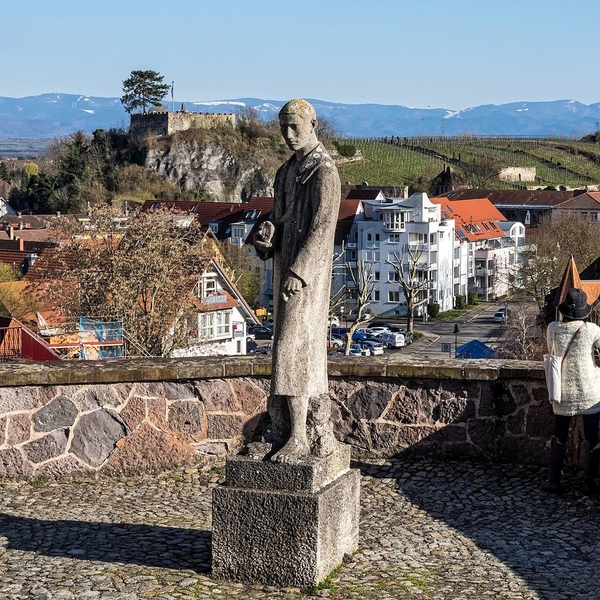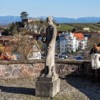Europe's rivers, and none more so than the Rhine, are marked along their ways by signs, some hidden and some not, of the wars and conflicts that marked centuries of history.
St Stephan's Cathedral, on its hill, dominates the skyline
Breisach, Germany shares all of that, but it also has a unique distinction among all the castles, forts, abbeys and tollhouses. On July 9, 1950, after centuries of changing rulers with every war and suffering major damage in World War II, Breisach became the first European community to vote for “overcoming political and economic borders within Europe, and the joining of European peoples to form a European federal state."
Only one of the flights of stairs leading toward the cathedral square
The vote, with over 96% of the town voting yes, came only months after the formation of the European Coal and Steel Community, the first step toward today's European Union. Since then, Breisach has called itself Europastadt, or Europe City.
The fiftieth anniversary of the vote was marked by the installation of a statue by local artist Heinrich Lutz, showing Europa the Bull bursting forth from the paving of the cathedral square, with a woman representing modern Europe on its back, reaching for a star. Another reminder of that reach can be found along the steps leading down to the lower town.
The town hall itself, just opposite the St Stephan Cathedral, pays tribute to the past history of the town; it's adorned with the coats of arms of every state that ruled it, including, besides Germany, and the German state of Baden, the Holy Roman Empire, Austria, France and several other independent and semi-independent principalities.
Breisach in the 1600s
Breisach's position atop a hill overlooking the Rhine is, of course, the reason for a lot of its history. The hill, today called Münsterberg, or Cathedral Hill, was home to a Roman fort. Through much of the town's history, everything centered on the fortified area around the hill, surrounded by a circle of walls that rises from the river plain to the top, passing through gates along the way.
While it's only a small town today, with a population of around 15,000, its location made it important to its various rulers and it prospered not only by supplying and feeding the armies stationed there, but also by trade along the river.
The Hagenbach tower, from the 14th century, served as a prison, including for its namesake governor when he fell from favor
Starting in 1275, Breisach got a couple of centuries of trade boost also from an imperial edict that required that all goods being shipped between Basel and Strasbourg had to be landed in Breisach to give local merchants an opportunity to buy.
Along the walls, the site of the ancient Anchor House, where goods were landed is now the site of two more recent memorials. The Ankerhaus itself was destroyed in 1793 during the wars that followed the French Revolution.

Photo: Jorgens.mi/Wikimedia
A bare-headed soldier, barefoot as well and devoid of insignia, serves as a memorial to all victims of war. Nearby is an even more unusual memorial that commemorates the Jewish community of Breisach, who were deported in October 1940 to a concentration camp in occupied France and then to Auschwitz.
The memorial has its roots in a campaign by Lutheran and Catholic schoolchildren for a central memorial for the Jewish communities of southwest Germany. The small memorial here is an outpost of the larger memorial that was erected in Neckarzimmern in 2004.
Above, the next hill over also has remains of ancient fortifications; Looking down from the same spot toward the newer part of town
Near the Cathedral and City Hall are a number of other points of interest, including this sundial, built by and dedicated to the area's wine growers and traders. Its legend is full of comic references to local wines and drinking and, as a final 'drunk' joke, it can never tell the correct time because the pointer is misaligned.
Others are reminders of now-gone parts of the fortifications, including these models. The first is the final gate that once stood at the entrance to the cathedral; it was torn down in 1880. The 'Witches' Tower,' also next to the cathedral, served as a prison for people accused of sorcery; I have no explanation for the wheels.
Roman roots: A Latin-inscribed gravestone was found under the cellar steps of the cathedral's clergy residence in 2013.
Turning away from the Münsterberg and its view out into the countryside around Breisach, I followed gently sloping paths and somewhat steeper steps, past quiet gardens and narrow streets toward the lower gate.
The Kaiserstühlerhaus, or Emperor's Seat Inn, has plenty of ivy, and plenty of unusual visual signs for its available activities. First time I've seen a TV watching icon or one for showers! And, since it was springtime in the Rhine valley, Spargel, or asparagus, features prominently.
The Kaiserstühlerhaus's hanging metal sign, below, was one of two especially nice ones in town; the other, with its mail coach on top and post horn hanging below gives away the Zur Post's earlier role as a stop on mail routes.
Breisach's shopping streets have a wide variety of shops and eating places. One of them shows a degree of modesty: Where many cities make absolute claims, Breisach's contender only claims to be 'probably the best curry sausage in Germany."
The central square of the lower town features a spurting fountain that became what spurting fountains always become. The combination of warm weather, wild water and young children ... well, you can see the result!
Just nearby, a church that was once the chapel of St Martin's hospital, now gone, and a most unusual sign for a physical therapy practitioner.
We were docked at Breisach on a Viking River cruise; I think I was one of the few aboard to spend the afternoon having a pleasant walk in the town. For cruise lines, Breisach isn't really the stop—it's the gateway to the Black Forest, and most visitors head there on excursions, barely noticing Breisach.


Comments (0)